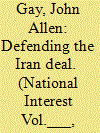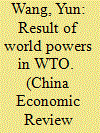| Srl | Item |
| 1 |
ID:
133793


|
|
|
|
|
| Publication |
2014.
|
| Summary/Abstract |
Nuclear talks have yielded a framework that buys time for negotiation and reduces the risk of miscalculation on either side.
IT WAS LONG PAST MIDNIGHT IN GENEVA last November when the rumors began to fly. Iran and the world powers had just reached a deal on its nuclear program. An international crisis that had been building toward what seemed like war for more than a decade was now on the path to resolution. The deal, a haggard John Kerry confirmed, was real. It wasn't comprehensive-Iran would still be heavily sanctioned and heavily centrifuged-but it was unprecedented. All prior efforts had fallen apart.
|
|
|
|
|
|
|
|
|
|
|
|
|
|
|
|
| 2 |
ID:
121718


|
|
|
|
|
| Publication |
2013.
|
| Summary/Abstract |
Iran's newly elected president, Hassan Rouhani, said he hopes for "more active negotiations" with six world powers over Tehran's controversial nuclear program after he takes office on Aug. 3.
|
|
|
|
|
|
|
|
|
|
|
|
|
|
|
|
| 3 |
ID:
101868


|
|
|
|
|
| Publication |
2010.
|
| Summary/Abstract |
THE BREAKUP OF THE USSR signified the start of the process of geopolitical changes everywhere in the former Soviet Union. Many regions have become spheres of national interests of the world's leading states. The geopolitical importance of the Caucasus is indisputable and not accidental. One possible proof is that more than 30 states have declared the Caucasus to be the zone of their interests.
|
|
|
|
|
|
|
|
|
|
|
|
|
|
|
|
| 4 |
ID:
124556


|
|
|
|
|
| Publication |
2013.
|
| Summary/Abstract |
Official reports and case studies reveal that China experienced different means of communication with the world powers since it joined the World Trade Organization in 2001. In the first five years, China had public communication with both the United States and the European Union under the Transitional Review Mechanism. In 2006 a new means of communication, the China-US Strategic and Economic Dialogue, started to take effect. Reports show that the new mechanism has advanced the China-US relationship positively and productively. The difference between the two means of communication stimulates our study. We adopt a game theory model to examine the impact of different communication protocols on China's incentives to reveal information. We analyze a cheap-talk game between an informed agent and two uninformed principals who coordinate actions under two communication protocols: public and private communication. First, all equilibria under both means of communication are characterized. Information precision of the agent's equilibrium messages decreases with the principals' preference biases. Second, under private communication the agent communicates more informatively with one principal if she in effect reveals little information to the other. Under private communication there exists an informative equilibrium with asymmetric levels of information precision even when all equilibria under public communication are uninformative.
|
|
|
|
|
|
|
|
|
|
|
|
|
|
|
|
| 5 |
ID:
124597


|
|
|
|
|
| Publication |
2013.
|
| Summary/Abstract |
The adoption of international norms by a state depends on the active support of decision makers in key gatekeeping positions. Yet, political change does not inevitably follow the initiatives of norm entrepreneurs. The literature on norm dynamics has largely focused on successful norm change. This focus on cases that support the notion that norms matter constitutes selection on the dependent variable. To more fully grasp the role and limits of gatekeepers, it is important to also investigate cases where political resistance prevented the domestic adoption of international norms. This study uses an illustrative case study in which circumstances appeared ripe for a new policy direction but where change failed to materialize. The study concludes that gatekeepers matter, but also that norm change crucially, depends not only on gatekeepers' ability to frame norms in terms that resonate domestically but also on their ability to build coalitions with other relevant political actors.
|
|
|
|
|
|
|
|
|
|
|
|
|
|
|
|
| 6 |
ID:
037286


|
|
|
|
|
| Publication |
London, Pinter Publishers, 1987.
|
| Description |
viii, 201p.hbk
|
| Standard Number |
0861879007
|
|
|
|
|
|
|
|
|
|
|
|
Copies: C:1/I:0,R:0,Q:0
Circulation
| Accession# | Call# | Current Location | Status | Policy | Location |
| 028344 | 964.8/LAW 028344 | Main | On Shelf | General | |
|
|
|
|